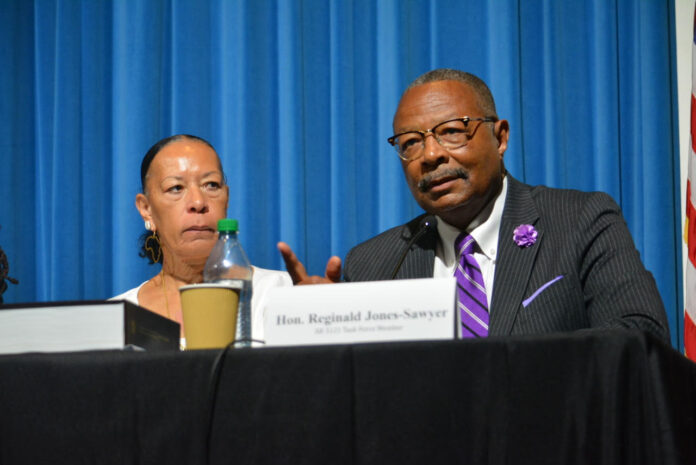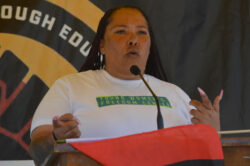
By Antonio Ray Harvey, California BlackMedia
Assemblymember Reggie Jones-Sawyer (D-Los Angeles), along with other Democratic lawmakers and April Grayson — a witness who last month testified against a sex trafficking bill proposing stiffer penalties for repeat offenders – have disclosed receiving death threats laced with the n-word and other racial slurs.
Jones and Grayson, who are both Black, said the threats and insults came by emails, telephone and social media.
“The number of death threats, people who threated to rape members of the Assembly and their families, the number of times people were called the ‘N-word,’ and staff members who may be with the LGBTQ community, were called the ‘F-word,’” are just a sample of what Jones-Sawyer told California Black Media (CBM) he was hearing. “They were calling like crazy. That’s not a place for public discourse. You can disagree but you don’t have to be disagreeable.”
The hate-filled messages came after Jones-Sawyer, chair of the Assembly Public Safety Committee and other Democratic committee members were criticized for not supporting Senate Bill 14 authored by Sen. Shannon Grove (R-Bakersfield). The legislation proposes adding the sex trafficking of minors to the list of “serious” crimes under California’s Three Strikes law. A conviction, including previous felonies, would increase prison sentences to 25 years to life. The trafficking of minors currently carries a prison term for up to 12 years, or 15 years to life.
On June 11, the Democratic majority on the Public Safety

committee unanimously abstained from voting on the bill. The committee’s two Republican members voted for it. The bill’s failure to advance from the committee drew national attention and sharp condemnation from conservative groups.
“After passing the Senate with a unanimous, bipartisan vote, I had hoped Democrats on the Assembly Public Safety Committee, led by Assemblyman Reggie Jones-Sawyer, would agree to make sex trafficking of a minor a serious felony. I am profoundly disappointed that committee Democrats couldn’t bring themselves to support the bill, with their stubborn and misguided objection to any penalty increase regardless of how heinous the crime,” Grove said in a statement after the committee vote. “Human trafficking of children is a growing tragedy that disproportionately targets minority girls, and California is a hotbed because of our lenient penalties.”
Two days after SB 14 failed in the Public Safety committee, it passed with a 6-0 vote. California Legislative Black Caucus members Assemblymembers Mia Bonta (D-Alameda) and Majority Leader Assemblyman Isaac Bryan (D-Ladera Heights) abstained from voting.

In a statement sent to CBM, Grove who has been the main champion of SB 14, addressed the threats and said such attacks against lawmakers should be taken seriously.
“It can be a felony offense to threaten public officials in California. I urge any legislative member who has received a threat to contact the Capitol police immediately so that an investigation can take place and those making threats can be held responsible for their abhorrent actions,” Grove wrote.
California Assembly Minority Leader James Gallagher (R-Yuba City), a strong supporter of SB 14, also condemned the death threats and hate messages and expressed his concerns about the attacks leveled at his colleagues from across the aisle.
“We need to get to a place where we can have a difference of opinion without the threat of violence…on any level,” Gallagher posted on X – formerly known as Twitter.
Jones has stated that he is committed to ending sex trafficking in California, but he wants to improve Grove’s bill so that it does not just result in more incarceration, considering that some of the offenders are victims themselves.
In the Legislature, Jones-Sawyer has also been a vocal supporter of shifting the focus of California’s criminal justice system from incarceration to rehabilitation. In California, Blacks make up under 6% of the state’s population but account for nearly 30% of prison inmates, according to the Public Policy Institute of California.
Grayson is one of those victim-offenders who was trafficked as a child but ended up spending 17 years behind bars. Born in Los Angeles, Grayson said she grew up in 22 different foster homes, going through one abusive experience after another.
Now, she is the statewide coordinator for the Young Women’s Freedom Center, Sister Warrior’s Freedom Coalition, a coalition of formerly and currently incarcerated women.
Since her release from prison in 2015, Grayson has been politically active. She worked on California Assembly Bill (AB) 124, which was signed by Gov. Gavin Newsom in 2021. The bill creates a channel for survivors of human trafficking to request a reduced prison sentence.
“(Grayson) broke my heart. She told us about being trafficked and then she became a trafficker. When she got caught, they put her in jail,” Jones Sawyer said. “Nobody ever gave her any counseling or found her a safe place where she could go. They didn’t have that 20 years ago. She was not only victimized by the trafficker, but she was criminalized by our criminal justice system.”
When the state legislature reconvenes on Aug. 14, the Assembly Appropriations Committee could hold a hearing on SB 14 as early as Aug. 16.
Jones-Sawyer says he hopes members of that committee can examine the legislation without attracting the attacks he and other members of the Public Safety committee had to endure.


